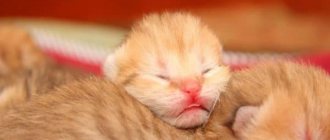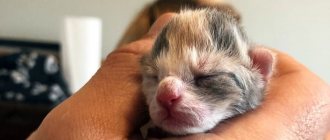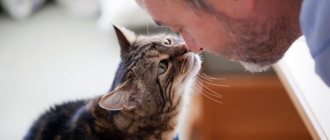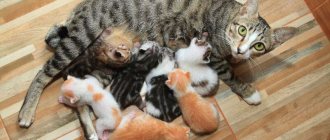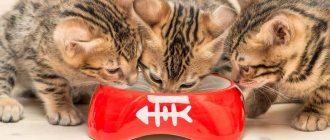Maternal instinct is an innate behavior pattern of an animal that ensures procreation. In cats, it usually works flawlessly. From the moment the cubs are born, mothers show maximum attention to the kittens, feeding them, washing them and protecting them from potential dangers. Often even from a person.
But, unfortunately, there are no rules without exceptions. Sometimes cats simply abandon their maternal responsibilities, dooming their newborns to starvation. But why does a cat leave newborn kittens? What principles underlie refusal of motherhood? And is it possible to save abandoned cubs if the mother cat still abandons them? First things first.
Why does a cat abandon kittens?
In most cases, the cat's behavior is influenced by stress. This is possible due to frequent births. If an animal gives birth twice in a season, the body is under a lot of stress. Accordingly, older kittens are just weaned, and new kittens appear in their place.
The cat is physically exhausted and may produce very little milk. Animals understand that there are no means to feed new offspring, so they abandon them.
Why does a cat abandon kittens?
- Eclampsia. This is a lack of calcium in a cat's body, which can cause it to die. A large amount of calcium is released along with milk, as a result of which bones begin to break down. The balance of electrolytes in the animal’s body is disrupted.
- Hormonal imbalance.
- Estrus immediately after birth. This also happens, although it is considered a pathology.
- Cat's unpreparedness for kittens , first birth.
- Too noisy place, excessive attention to kittens from people.
Kittens
When to suspect a problem
For primiparous cats, a lack of interest in kittens in the first hours after birth is considered normal. The animal experiences new and rather painful sensations for the first time, which causes severe stress. Give mom some time, and the hormones will awaken her maternal instinct.
At this stage, it is worth remembering three main recommendations from veterinarians:
- minimize the number of people nearby;
- isolate other animals living in the house (especially dogs and cats);
- do not touch newborns with your hands unless necessary;
- reassure and encourage the mother with praise (only if the pet loves affection and shows that it needs your participation).
The first signs that things are not going according to plan are:
- complete ignoring of kittens and refusal to feed (more than a day, or if symptoms appear suddenly, although the cat previously tried to feed the babies);
- nervous behavior and desire to hide babies (for a wild animal such behavior would be the norm);
- aggression towards newborns;
- causing damage or eating.
Some of the events described may shock an unprepared owner, but do not always indicate serious deviations in the psyche or general condition of the animal. Let's look at all the possible reasons for abandoning kittens in more detail.
The cat abandoned her kittens - what to do?
What to do if you are not ready to accept the death of kittens? There are several options to solve the problem.
The cat abandoned the kittens, what to do:
- The simplest and most profitable way is to find a nursing cat. Very often, cats add new babies to newborn kittens that their mother has abandoned. Oddly enough, cats usually never separate kittens and do not throw them out of the nest or box. Accordingly, they take care of them in the same way as their offspring.
- Where can you find a cat? There are many veterinary forums and animal shelters. This is where you can find a nursing cat. In this case, you will have to take her home with your offspring.
- This is the simplest option, because the cat requires not only milk, but also other skills and functions.
Kittens
Visits to a veterinarian
If you have any questions about caring for kittens, please contact your veterinarian. He will tell you all the nuances, talk about vaccinations and check the pet’s health. Be sure to visit the clinic if something in the kitten’s behavior or appearance confuses you. Reasons for visiting a veterinarian may include discharge from the kitten's eyes or nose, unusual lethargy, lack of appetite, unusual stool, and injuries.
Caring for newborn kittens is a difficult and responsible task, but with proper attention and patience, you will be able to feed and raise them.
The cat abandoned the kittens - how to arrange the place of detention?
If, nevertheless, the cat left the kittens, the best option is to invite a donor, or a surrogate mother. But most often this is not possible. Then you will have to take care of the kids yourself.
The cat abandoned the kittens, how to arrange the place of detention:
- At the first stage, you need to prepare a house for them. This could be a shoebox lined with soft, warm material. It could be a wool blanket. Please note that the house must be spacious enough.
- It is necessary to divide it into two parts, put bottles of hot water in one, cover with a blanket, the second part of the house should be without bottles. This is necessary if the kittens suddenly become hot.
- The temperature of the bottled water should be approximately 37-40 degrees. The optimal temperature for nursing kittens is 30 degrees. It is at this temperature that cats keep their babies. Next, you must also ensure that the place is secluded and secluded.
- There is no need to allow children to constantly carry babies in their arms. This can affect their health and even cause death. Contact with people is stressful for babies. Regular feeding is required every 2-3 hours.
Notice that the cat in the nest is constantly licking her kittens, cleaning them.
Kittens
Treatment and prevention
Few people think about whether a cat can eat a kitten. This behavior is not normal and is considered pathological. There is no specific treatment.
Some veterinarians believe that maternal aggression is genetically transmitted
It is advisable to remove from breeding a cat that has at least once engaged in cannibalism. You can check her hormone levels, but the correction is difficult and long. Therefore, it is better to sterilize the female and not allow her near the kittens.
If your cat shows anxiety or aggression at the sight of newborn babies, you can give her mild sedatives. Sometimes the animal calms down when the “nest” is placed in a dark and closed room.
It is not always clear why a cat eats kittens. This behavior is considered strange and atypical. In some cases, aggression may appear only towards cubs that are 2-3 months old. This behavior is normal, since parents always drive their offspring away from their territory. At this age, kittens can already arrange their lives on their own.
How to keep newborn kittens without a cat?
In addition to a constant source of nutrition, babies need warmth, a feeling of fullness, and a mother’s heartbeat. This is why the best option is to find a nursing cat. However, if it is not there, there are ways to deal with such a situation. You will have to put in a lot of effort.
How to keep newborn kittens without a cat:
- Please note that newborn kittens are not much different from human babies. They also need to be fed initially every 2 hours, then every 3 hours.
- If there is no cat, the kittens get dirty and can get stuck in their feces. Therefore, it is necessary to moisten the disc in warm water and wipe the entire kitten completely. This will also serve as a kind of massage that will help the kittens with their bowel movements.
- You should be prepared for the fact that newborn kittens may suffer from constipation due to an incompletely formed digestive system. It is for these purposes that animal massage is performed.
- Check the temperature in the nest from time to time. It should be at 30 degrees. In the second and third weeks, a temperature drop of 24-27 degrees Celsius is allowed.
Cat
Reasons for abandoning offspring
Not every pet has such a strong maternal instinct as a cat. From the first minutes of the kittens' life, she fiercely protects and cares for her offspring.
A cat may refuse to feed newborn babies due to illness or stress. As felinologists note, a cat can leave the “nest” and abandon its offspring due to age, stress and other circumstances. It is important to understand that there is no such thing as a “bad cat mom.” If an animal refuses to feed kittens, you need to look for psychological or physiological reasons.
Non-viability of offspring
At an instinctive level, a cat detects a sick or hypothermic (low body temperature) kitten and refuses to nurse it. This kind of situation is often observed with a large litter: the female gives the right to life to stronger babies, feeling that there is not enough milk for everyone.
A weakened kitten is not always viable. A person can deliver such a baby by providing him with the correct temperature conditions, proper conditions of detention and feeding him with milk formulas.
Stress
Excessive fuss and attention of the owner to the process of delivery and newborn kittens can cause stress in the animal. As a result of accidental or intentional human intervention in the life of an animal, a cat may refuse to raise and feed its offspring.
Age
According to veterinarians, a cat that has not reached the age of puberty, but has already become a mother, does not want to nurse a litter. There is no need to rush and take the kittens from the “nest”. On the second day, the animal's maternal instinct may awaken.
The owner’s task is to provide the pet with complete rest and feed newborn babies with formula milk during the first day of life.
Lack of milk
One of the common reasons why a female abandons her offspring is the lack of milk due to hormonal imbalance as a result of premature birth. The cat began to give birth before the body had completely adjusted to a new way.
Foreign odors
A newborn kitten has the scent of its mother. If a person picks up a baby who has barely been born, he breaks the “baby-mother” connection. The animal may stop feeding the kitten, from which it does not catch its scent.
Weak maternal instinct
A pet spoiled by human attention does not feel responsible for its newborn offspring. A cat with a weak maternal instinct is not ready to breastfeed and care for her own offspring.
Feeding and caring for small blind kittens rests on the shoulders of humans.
How to feed a newborn kitten without a cat?
Kittens cannot lap on their own; they must be fed with a syringe or pipette. A mandatory condition is a tummy massage. It is carried out immediately after feeding the crumbs. It is necessary to make longitudinal movements in the direction from the head to the tummy, lightly massaging.
How to feed a newborn kitten without a cat:
- There is no need to give kittens water. Everything you need is contained in the mixture. Under no circumstances should babies be fed pure cow's milk.
- It can negatively affect the digestive system of animals. Kittens that are fed milk often experience diarrhea, indigestion, constipation, or even diarrhea. It is necessary to prepare a special mixture.
- Starting from two weeks of age, it is necessary to purchase soft, wet food for kittens. It is added to the milk mixture in an amount of approximately 1/3. Gradually the amount of wet food in the mixture increases. Already at the age of 3 weeks, the kitten can be fed wet food.
Cat feeding puppies
Instinct with damage
There are cats whose hunting instinct is poorly developed and they do not catch mice. And there are those whose maternal instinct is poorly developed. Of course, there are few of these, because this is, in fact, a mistake of nature, but such cats still exist.
Whatever the reason why the cat abandons the kittens and leaves, you should not scold or hit her, this will only make the situation worse. A sick animal must be treated. In other cases, you can try to “reconcile” the mother and cubs by calming the cat down, talking kindly to her and expressing your approval in every possible way.
If this does not help, there is only one thing left to do - find a nurse for the “orphans” or take on maternal responsibilities. But this is a topic for another discussion.
What and how to feed blind kittens without a cat: recipes for mixtures
Cow's milk is not suitable for feeding and does not contain all the nutrients.
What and how to feed blind kittens without a cat, formula recipes:
- A mixture of cow's milk with eggs and vegetable oil . For approximately 220 ml of cow's milk you need 2 chicken yolks and 50 ml of vegetable oil. It is better to take refined one. This whole mixture is shaken and heated in a water bath to a temperature of 35 degrees. This mixture can be fed to kittens.
- You need to dilute 400 ml of condensed milk without sugar with water and add about two tablespoons of bone meal. The mixture is shaken and heated before feeding. If you don’t want to prepare anything, you can safely use mixtures that are sold in veterinary clinics. However, their cost is quite high, so not everyone can afford to purchase such products.
Please note that it is also necessary to accurately calculate food standards for babies. Under no circumstances should you overfeed. On average, about 4-5 ml of formula is needed per 100 g of kitten. If the kitten weighs 250 g, the optimal amount is 10 ml of mixture. Prepare the mixture for one day, store in the refrigerator. Never use two-day formula to feed babies.
Homeless
Feeding mode
In the first month, it is very important for the health of small pets to follow a routine and feeding regime. During the first week, kittens nurse from their mother cat approximately every 60-70 minutes for 24 hours.
Feeding schedule for kittens up to a month:
- For the first 14 days, feed the kittens every two hours at night and during the day. The norm is 30 ml per 100 grams of kitten weight.
- From the second to the third week - once every 2.5-3 hours. The norm is 35-40 ml per 100 grams of weight.
- Starting from the third week, kittens are fed every 3-4 hours during the day and at night - every 5-6 hours.
- From 30-36 – every 3.5-4 hours during the day and once at night. The norm is 4045 ml per 100 grams of weight.
- Accordingly, owners should feed them with the same frequency, without losing their schedule and daily routine. Stick to the regimen until the kittens begin to eat on their own.
How to syringe feed a newborn kitten?
We'll have to prepare for sleepless nights feeding the babies. Newborn kittens are not able to lap up milk on their own; they must be fed with a syringe or pipette.
How to syringe feed a newborn kitten:
- It is necessary to squeeze out the milk little by little, drop by drop. There is no need to insert a syringe into your mouth; you need to place the tip on your lower lip and apply pressure.
- Gradually, drop by drop will appear, and the kitten will lick off the food.
- You should not dip your baby's face into the mixture; it can get into the respiratory tract, which can cause suffocation.
Feeding kittens
What to feed a kitten without a cat for 1 month?
Starting from 2-3 weeks of age, babies must be switched to standard food.
What to feed a kitten without a cat for 1 month:
- In no case should dry food or wet canned food be introduced into the food at the initial stage. Kittens must be switched to dry food starting at 4 weeks of age.
- Never use food for adults, as it does not contain enough minerals and trace elements to meet the needs of babies.
- How do you know that a kitten is developing correctly and is healthy? It is necessary that at the age of about 1 month the kitten weighs 250-500 g. This indicates that there are enough nutrients and food for the baby.
Kids
Rules of care
Maternal care is not only about feeding kittens on time. You will also need to make up for the lack of physical warmth and create comfortable conditions for the kids. First of all, make sure that they are not freezing. It will also be necessary to help the offspring relieve itself during the first month of life. To do this, during feeding, massage the kitten's lower abdomen so that he can defecate.
Don’t forget to wipe the kittens’ faces with a damp cloth or wash them after each feeding. Take proper care of the animals and you will be able to breed such animals if you wish.
Recommended Posts
Similar article: How to choose a ring for a dog show: recommendations from dog handlers
Standard height and weight of the Cane Corso breed by month
Weight of a puppy and an adult Labrador by month
Weight and height of a German Shepherd puppy by month
Description and content of the hunting border terrier
Description and care of the highly intelligent Border Collie breed
Description of forms and features of treatment of enteritis in cats
What to feed kittens: reviews
Of course, nursing kittens is a rather complex manipulation, so we recommend that you read the reviews of kitten owners.
What to feed kittens, reviews
Veronica, 30 years old . I became the owner of two kittens completely unexpectedly for myself. Not far from our multi-storey building, a cat brought kittens, but for some reason, at the age of about 2 weeks, she threw them out of her den. The two kids could barely move around the yard, as they practically couldn’t walk. Their paws moved in different directions. Judging by the not fully open eyes, I concluded that the babies were about 2 weeks old. I fed the babies approximately every 3 hours. I purchased a special mixture. In addition, the kittens constantly meowed and called for their mother. I placed the box with the babies near the radiator. I think it was cozy there. For another two weeks I woke up at night and fed the kittens. Already at the age of one month she began to give regular cow's milk and special canned food.
Elena, 35 years old. I live in my own house, and not long ago we got a new cat in our yard. As I understand it, she came to us already pregnant. After she brought the kittens, she disappeared somewhere. As a result, I had to take care of 4 kittens. To do this, I prepared the mixture myself from cow’s milk, eggs and sunflower oil. She fed with a syringe. Unfortunately, one of the four kittens died. No matter how hard I tried to massage him, he defecated with great difficulty. 5 weeks have passed, three kittens are running around the yard, they are healthy and playful.
Evgeniy, 30 years old. My cat recently gave birth to kittens, but unfortunately, due to health problems, we had to take her to the veterinary clinic. We were advised to temporarily wean the cat away from kittens due to eclampsia. We gave vitamins and injections because the cat stopped walking with her hind legs. The kittens had to be looked after on their own. I have three children who regularly monitored the babies’ condition. They were fed with a special mixture, which was purchased at a veterinary clinic. A week later, the cat came to her senses, but, unfortunately, due to lack of milk, she was unable to feed them. But she continued to lick them, so all questions regarding bowel movements, as well as cleaning the babies, disappeared. The cat performed these duties independently. But we had to feed. Now the kittens are alive and healthy, gaining weight well. The cat also recovered.
Friendship
Remember, an animal is not only a source of food for its babies, but also a heater and a nanny. You will have to perform all the functions of a mother.
Mom got sick
Another reason why a cat leaves kittens may be her poor health and health problems.
For example, due to a hormonal imbalance caused by childbirth, the animal simply does not produce milk. The same thing happens to cats after anesthesia for caesarean section. Lack of lactation is one of the reasons why a cat leaves newborn kittens.
Also, in cats that have recently given birth (especially in very young and, conversely, older cats), endometritis often occurs - inflammation of the uterine mucosa. In this case, mothers simply lose milk, and they run away from their babies or throw them out of the “nest”: this is what nature dictates.
In addition, mother cats often experience mastitis, that is, inflammation of the mammary glands, and the feeding process becomes so painful that they have no choice but to escape from the kittens and from the painful sensations.
Severe calcium deficiency
The third common illness of the postpartum period is eclampsia. It is also called milk fever or postpartum tetany. The essence of the disease is an acute lack of calcium, so an unbalanced diet of an animal during pregnancy increases the risk of the disease many times over.
In this case, the cat may not only abandon the kittens, but also show aggression or increased anxiety, for example, biting the babies or anxiously dragging them from place to place.
Only a specialist can diagnose the disease in giving birth cats and prescribe the correct effective treatment. It’s better not to skimp on a visit to the veterinary clinic: all these ailments are quite dangerous. The same eclampsia can lead to the death of a cat, and very quickly.
